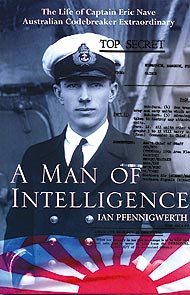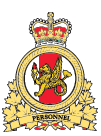 This information has been archived for reference or research purposes.
This information has been archived for reference or research purposes.
Archived Content
Information identified as archived on the Web is for reference, research or recordkeeping purposes. It has not been altered or updated after the date of archiving. Web pages that are archived on the Web are not subject to the Government of Canada Web Standards. As per the Communications Policy of the Government of Canada, you can request alternate formats on the "Contact Us" page.
Book Reviews
A Man Of Intelligence: The Life Of Captain Eric Nave, Australian Codebreaker Extraordinary
by Ian Pfennigwerth
Dural, New South Wales, Australia: Rosenburg Publishing, 2006
304 pages, AU$ 29.95
ISBN 97818-770-58417
Reviewed by Craig Coish
For more information on accessing this file, please visit our help page.
 A Man of Intelligence is a necessary read for the military historian, and an excellent signal intelligence primer for the budding intelligence student – or the interested amateur. Captain (ret’d) Ian Pfennigwerth, Royal Australian Navy, has drawn upon his extensive 35 years of experience to capture and relate an objective account of the life and times of Captain Eric Nave, a stalwart naval officer who can boast exemplary service with both the British and the Australian navies. Captain Nave is credited with, if not single-handedly providing the seeds of the Australian signal intelligence effort, then at the very least, with creating a hospitable environment to sustain this effort, until its blossoms could be viewed and appreciated by those of lesser vision.
A Man of Intelligence is a necessary read for the military historian, and an excellent signal intelligence primer for the budding intelligence student – or the interested amateur. Captain (ret’d) Ian Pfennigwerth, Royal Australian Navy, has drawn upon his extensive 35 years of experience to capture and relate an objective account of the life and times of Captain Eric Nave, a stalwart naval officer who can boast exemplary service with both the British and the Australian navies. Captain Nave is credited with, if not single-handedly providing the seeds of the Australian signal intelligence effort, then at the very least, with creating a hospitable environment to sustain this effort, until its blossoms could be viewed and appreciated by those of lesser vision.
A promising young paymaster employed by the South Australian Railway, Eric Nave’s entrance into service with the Australian navy in early 1917 was, ironically, an alternative career choice, since his family did not have the immediate resources for him to pursue the legal career he so desired. This proved to his good fortune, and, indeed, to the good fortune of the naval service as well.
Traditional military gentry viewed the unauthorized reading of another country’s private correspondence as a “less than chivalrous” pursuit, one beneath those of honourable status within the profession of arms. Despite this long-held popular opinion, then-Paymaster Lieutenant Eric Nave not only recognized the value of reliable intelligence, he had the talent, the mental fortitude, and, most importantly, the good fortune to be assigned to this very necessary effort.
Capt Pfennigwerth has carefully researched and then documented some excellent examples of how Nave’s cryptanalysis efforts directly or indirectly contributed to both the pre-war indicators and the many operational Allied successes in the Pacific theatre. Of particular note was the very spontaneous Operation Lightning Strike – the interception, the code breaking, and the ready access to Japanese intelligence information that yielded the itinerary and coordinates leading to the subsequent shooting down of Admiral Yamamoto’s personal aircraft. The success of this operation dealt a significant blow, not only to the Imperial Japanese Navy, but also to the Japanese war effort as a whole. Operation Lightning Strike is acknowledged by many as one of the key actions that initiated the shift of momentum in favour of the Allies in the Pacific. This example, coupled with many others, discreetly reveals how many of our lauded military strategists were supplied with valuable intelligence information, and how they very shrewdly applied those advantages of superior intelligence and cryptanalysis to develop superior tactics and to reduce allied casualties. One can only speculate upon the outcome of events had the signal intelligence effort been ignored or marginalized, or had the fortunes of cryptanalysis been reversed.
As a biographical read, A Man Of Intelligence: The Life of Captain Eric Nave, Australian Codebreaker Extraordinary, contains an excellent formula of personal data, little known accomplishment, and thought-provoking questions. The historical value contained within provides ample argument, “if history is destined to repeat itself – why not employ actions (Signal Intelligence) that will allow us to control which portions we repeat.” As our technological boundaries advance at phenomenal rates, and access to information has broadened a thousand fold, the lessons uncovered by Captain Nave, and related by Captain Pfennigwerth, remain as relevant today as they were in 1943. I would readily recommend this book to any interested reader.
![]()
Captain Coish, an intelligence officer, is Adjutant of the Canadian Forces School of Electronics and Communication in Kingston.






